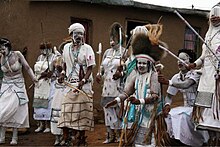
Umxhentso is the traditional dancing of Xhosa people performed mostly by Amagqirha, the traditional healers/Sangoma. Ukuxhentsa-Dancing has always been a source of pride to the Xhosas as they use this type of dancing in their ceremonies.
This dancing includes overt shoulder movements that include shaking the thoracic (this is called ukutyityimba) and the rest of the upper body, stomping barefoot. Umxhentso is usually accompanied by a drum beat or slow vocal music called ukombela with clapping to give the dancers a rhythm to follow.
Characteristics
Xhosa people wear beaded clothes when they perform umxhentso. The name of these traditional garments is umbhaco, while their cousins, the Zulus, wear animal hide (men) and colourful clothing and beads (women). They usually paint themselves prior to performing. Umxhentso is mostly performed in the Transkei homeland in the Eastern Cape Province of South Africa where the tradition is still valued.
Musical accompaniment includes :
- Uhadi musical bow
- Drum Beat
- Composition and singing of theme songs called ukombela
- A whistle-Impempe made out of Ingcongolo reed
Categories
The different types of Umxhentso are:
Umngqungqo
An ancient dance performed by old women. It is performed in ritual ceremonies. It requires little movement and is considered to be highly dignified. It is slow and accompanied by low-pitched music and clapping. The umgqungqo is performed on wedding ceremonies, when a young girl is matured normally after puberty or in her teens Xhosa people used to have arranged marriages called 'ukuthwalwa' then on wedding ceremony called 'umendiso' theme songs are sung.
Umdudo
This is a dance that is performed in weddings. The word Umdudo is derived from the verb ukudada which means to swim. The choreography of this dance includes spinning up and down. This type of dancing is often accompanied by ‘umbholorho’, songs performed at weddings (Umtshato ).
Intlombe
Intlombe is performed by traditional healers/Amagqira during their initiation ceremonies. The term Ukuxhentsa (verb) represents a dance performed by young girls during festivals and traditional ceremonies.
Umguyo
This is a rite passage celebration by boys who are going to initiation school for transition from boyhood to manhood through *Ulwaluko.
See also
References
- Bührmann, M. V. (3 November 1981). "The Xhosa Healers of Southern Africa: 1. Intlombe and Xhentsa: a Xhosa healing ritual". Intlombe and Xhentsa: A Xhosa Healing Ritual. J. Anal. Psychol. 26 (3): 187–201. doi:10.1111/j.1465-5922.1981.00187.x. PMID 7275804. Retrieved 3 November 2018 – via PEP Web.
- Sylvia, Sotewu, Siziwe (1 February 2016). "A visual narrative reflecting on upbringing of Xhosa girls with special references to 'intonjane". Uir.unisa.ac.za. Retrieved 3 November 2018.
{{cite journal}}: CS1 maint: multiple names: authors list (link) - "Facts About The Xhosa People And Their Culture". Buzzsouthafrica.com. 9 July 2013. Retrieved 3 November 2018.
- "Xhosa". Sahistory.org.za. 3 April 2011. Retrieved 3 November 2018.
External links
- "Xhosa People of South Africa". Panafricanrevoluntionmovement.wordpress.com. 18 October 2017. Retrieved 3 November 2018.
- Chidester, David; Kwenda, Chirevo; Wratten, Darrell; Petty, Robert; Tobler, Judy (3 November 1997). African Traditional Religion in South Africa: An Annotated Bibliography. ABC-CLIO. ISBN 9780313304743. Retrieved 3 November 2018 – via Google Books.
- Wiki Loves Africa
| This article needs additional or more specific categories. Please help out by adding categories to it so that it can be listed with similar articles. (September 2022) |